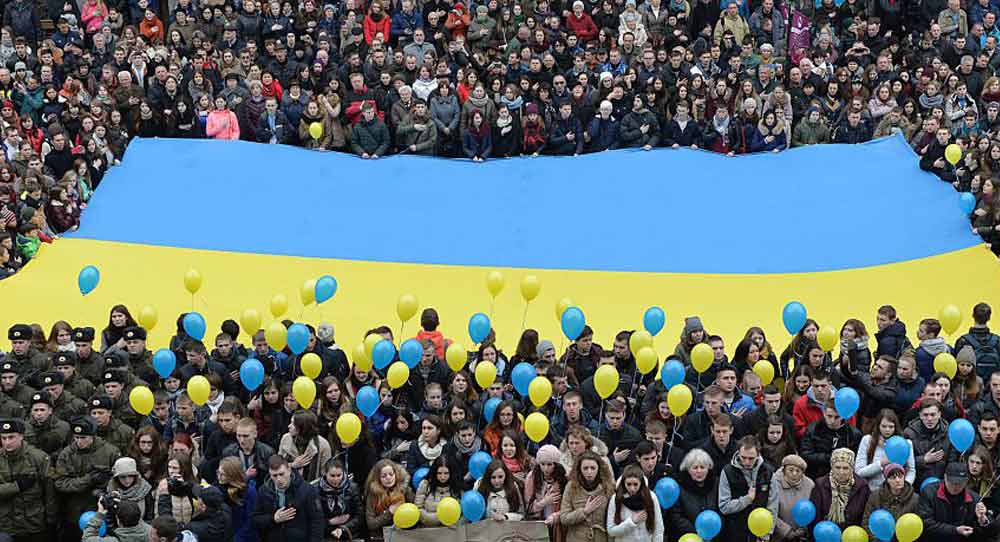The country most poised to glean clues from German Chancellor Angela Merkel’s forthcoming trip to Washington is Ukraine. Merkel and her government are widely seen as a source of expertise on how to engage with Russia and, more specifically, with President Vladimir Putin. This expertise is bound to play a role at her meeting with U.S. President Donald Trump, whose Russia policy is still nebulous. Due to flight cancellations related to bad weather in the United States, the visit, originally scheduled for March 14, has been postponed until March 17, prolonging the Ukrainian waiting game. The meeting could send a signal that Trump recognizes the significance of Ukraine for European security, at least rhetorically.
In the meantime, Ukraine is trying to reassert itself as an actor on the international stage. On March 6–9, the International Court of Justice in The Hague held a four-day preliminary hearing on a case initiated by Ukraine against Russia in mid-January. The judges now have to decide whether the case is permissible under the court’s rules and whether the Ukrainian call for immediate direct measures to be imposed on Russia is justified. Given its broader significance, the event received too little coverage overall.
At the International Court of Justice—not to be confused, as it was by many, with the International Criminal Court—states, rather than individuals, are the accusers and the accused. Ukraine is trying to use an instrument of international law to increase the visibility of Moscow’s March 2014 annexation of Crimea and Russia’s role in the war in Ukraine’s eastern Donbas region. Kyiv thereby reminds the international community of the values and norms it committed to after the end of World War II.
Ukraine’s legal documentation details the political context of Crimea’s annexation and the war, but the court case is defined more narrowly. For a case to be permissible, both sides have to accept the role of the court. Two UN conventions, ratified by both Ukraine and Russia, are at the center of the Ukrainian case: the International Convention for the Suppression of the Financing of Terrorism and the International Convention on the Elimination of All Forms of Racial Discrimination.
Both agreements provide only a limited fit for the situations in eastern Ukraine and in Crimea. Ukraine has used the term “terrorism” throughout the war to describe activities in the occupied territories and, in particular, Russian military and financial support. But in the context of the terrorism convention, it is unlikely that the court will accept the Ukrainian labeling of developments in eastern Ukraine. Meanwhile, Kyiv uses the racism convention to pinpoint Russia’s increased pressure on the Crimean Tatars in Crimea since the annexation. Here, the fit is potentially closer.
A further hurdle is required for the court to take on a case: both sides have to engage in what the tribunal considers genuine attempts to resolve the dispute at stake. Following the 2008 Russian-Georgian War, Georgia addressed the court on the basis of the same racism convention. However, the judges ruled that the case was not permissible, as in the eyes of the court, the two sides had not engaged in a constructive dialogue about conflict management.
Ukraine has gone a little further in its attempts to prove that a more meaningful engagement has taken place. But neither Russia nor Ukraine has been willing to seek a compromise now or as part of the Minsk negotiations aimed at resolving the conflict. Legal action against Russia is bound to generate an even more hostile stance on the Russian side.
At this point, it is unlikely that the court will even accept the case; a decision on this is expected in April. If it does take on the case, no quick decision will follow. Most cases last several years. But even if it eventually came to a verdict, Moscow has declared repeatedly that the Russian Constitutional Court decides whether or not Russia accepts rulings by international courts. Despite a relatively good track of implementation in the court’s overall small number of cases, the body has no means to force a country to implement a ruling.
Therefore, the pending case of Ukraine v. Russian Federation at the International Court of Justice is primarily a political and symbolic act by the Ukrainian government to counteract the lack of attention paid to Ukraine on the international scene. As such and because of its timing, it is more important than many might think.
When Merkel meets Trump on March 17, the court case will be a reminder to her and other Europeans that neglect of Ukraine is as high a risk as a deal between the United States and Russia on the two countries’ respective spheres of influence.
Gwendolyn Sasse is a nonresident senior fellow at Carnegie Europe and director of the Center of East European and International Studies (ZOiS) in Berlin.







.jpg)
